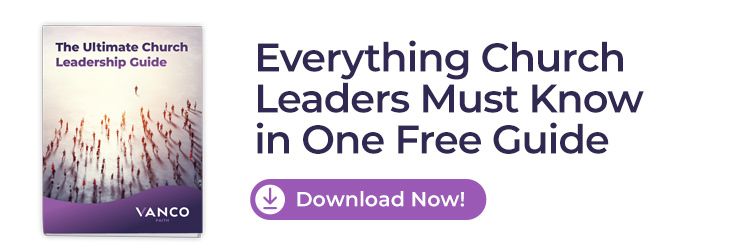 Tithing is a vital source of income and inspiration for churches that demonstrates church members’ dedication and commitment, but more practical issues, such as the question, “Is tithing tax-deductible?” is a necessary part of the tithing system. Based on each church’s and church donor’s financial situation and tax status, many are likely to be concerned about IRS rules for church offerings. So, it’s important for churches to understand these rules and provide accurate information and records related to church tithes and offerings to donors.
Tithing is a vital source of income and inspiration for churches that demonstrates church members’ dedication and commitment, but more practical issues, such as the question, “Is tithing tax-deductible?” is a necessary part of the tithing system. Based on each church’s and church donor’s financial situation and tax status, many are likely to be concerned about IRS rules for church offerings. So, it’s important for churches to understand these rules and provide accurate information and records related to church tithes and offerings to donors.
In fact, a related question, “Are tithes considered charitable donations?” is an essential topic for many individuals, businesses and churches themselves. Donations provide a vital lifeline that enables churches to fund their ministries and help their communities, but there are also many mundane but important rules and reporting requirements for these donations that donors and churches alike must understand.
Table of Contents
- FAQs for Tithers
- FAQs for Churches Receiving Tithes
- The Symbiotic Dance: Online Giving Providers and ChMS for Impeccable Stewardship
- Elevate Church Finances Like Never Before
FAQs for Tithers

- Are Tithes Considered Charitable Donations?
- Is Tithing Tax-deductible?
- Should You Claim Your Tithes on Your Taxes?
- Should You Tithe on Tax Refund?
- How Much Tithing Is Tax-deductible?
- How Does Tithing Affect Your Taxes?
- How Do You Claim Church Donations on Taxes?
- What Are IRS Rules for Church Offerings?
- Tithing Before or After Taxes? What’s the Right Way to Tithe?
Many congregants participate in tithing as a way to practice their faith, support their places of worship, give back to their communities and more. While tithing can be an excellent way to support their communities and practice their faith, what issues must church members consider regarding taxes? Are tithes considered charitable donations? Is tithing tax-deductible?
Many congregants may wonder about these important topics. To better understand them, let’s explore these questions, some IRS rules for church offerings and how to claim church donations on taxes, if possible.
Are Tithes Considered Charitable Donations?
To answer this question, it’s important to first answer the question: “What is a tithe?” Originally, tithing was the act of contributing ten percent, or a tenth of one’s earnings (or crops, or livestock — the tradition goes quite far back). In many Christian churches, the act is still carried out as some Christians feel they’re called to tithe.
Today, tithing doesn’t necessarily mean or imply that the amount is a tenth of one’s income, but many churches pass collection baskets or tithing boxes and congregants can offer contributions. Additionally, some churches do call their congregations to tithe.
So, are tithes considered charitable donations? Fortunately, the IRS is very transparent when it comes to charitable donation rules and has published extensive guidelines to answer this question!
For a contribution to be considered a charitable contribution by the IRS, the organization to which one contributes must be qualified as a charitable organization for tax purposes. The IRS makes this easy to figure out. To find out if your church is qualified as a charitable organization, you can use the IRS Tax Exempt Organization Search tool.
If the church or place of worship to which you contribute is qualified as a charitable organization, your tithes may be considered charitable contributions for tax purposes. So, what does that mean? Does that mean that tithing is tax-deductible? Let’s explore.
Is Tithing Tax-Deductible?
In short, the question, “Is tithing tax-deductible?” depends on a few factors. For one, it depends on whether or not the church you’re tithing to is considered a charitable organization, and churches very often are. This is because churches are automatically considered tax-exempt as long as they meet the requirements in IRS Code Section 501(c)(3). There are organizations that identify as churches but are not considered churches by the IRS. This may be because they do not fit the criteria outlined in IRS Code Section 501(c)(3).
Assuming you’ve determined that your church is a tax-exempt charitable organization according to the IRS, you may be allowed to take tax deductions if you contribute to the church.
Even though many churches might meet the criteria to automatically be considered tax-exempt, charitable organizations, church leaders often feel that it’s important to apply for IRS recognition as tax-exempt churches because this can make congregants and other potential donors feel comfortable and more empowered to make donations.
Should You Claim Your Tithes on Your Taxes?
This is a complex question, and there’s no single answer. However, there are important reasons why or why not you may claim tithes on your taxes. Additionally, in some cases, it may be required by law to report any donations you make to the IRS.
If your church isn’t considered a tax-exempt charitable organization, it may not be possible to claim a tithe on your taxes. Additionally, some congregants feel that tithes are a personal matter between them and their churches or between them and God and they may not wish to involve the government in this process.
Ultimately the question of whether or not to claim your tithes on your taxes is a personal one that only you can answer. It’s important to remember that answering the question, “Is tithing tax-deductible?” isn’t always yes. Even if it often is, you’re not required by law to claim your tithes on your taxes.
IRS rules for church offerings require that if you make charitable donations, in many cases, you must report them. This doesn’t mean that you must claim a deduction, but the IRS requires that if you make a charitable donation of $250 or more, you must keep a written record of the acknowledgment from the charitable organization to which you donated. That acknowledgement must include:
- The contribution amount
- A description of any noncash property you donated
- A statement indicating whether you received anything in exchange for the donation, and if so, what it was and an estimate of its monetary value
If you make a noncash contribution totaling more than $500, the IRS also requires that you fill out Form 8283, Noncash Charitable Contributions.
Should You Tithe on Tax Refund?
For many who feel the call to tithe, the question can arise: should you tithe on your tax refund? In short, this depends on your personal beliefs and potentially your church’s policy. If you’ve tithed throughout the year, your tax return is based on income you’ve already tithed on. In other words, if you choose to tithe on your tax return, you’re exceeding the 10 percent threshold that you’re contributing in total. So, if you feel that you’re called to tithe and offer exactly 10 percent, you may not feel that you should tithe on your tax return, and that’s fine. However, if you wish to contribute more, then you should!
Ultimately, this is a personal decision. Consider your values and beliefs and what your church expects from you as you make it.
How Much Tithing Is Tax-deductible?
So, in addition to asking, “Is tithing tax-deductible?”, you need to know how much tithing is tax-deductible. While there is no technical limit on the amount an individual can claim as deductions, there is a general total deduction limit on charitable contributions that taxpayers may need to be aware of.
In general, you may not deduct more than 60 percent of your gross adjusted income for charitable donations. However, there may be cases where the limit is lower. So, as long as tithing comprises at most 10 percent of your total income, it’s highly unlikely that you’ll reach that total deduction limit through tithing alone.
However, if you’ve already claimed more than 50 percent of your total adjusted gross income (AGI) from other charitable donations, you may not be able to claim all your tithings as deductions.
How Does Tithing Affect Your Taxes?
We’ve explored how tithing and taxes can interact, but it can be helpful to take a holistic look at the ways tithing can affect your taxes, including:
- Tithes can often be deducted: This can mean that tithing ultimately lowers your total taxable income. However, it’s important to remember that tithing must be qualified as a deductible contribution, which means that the church you tithe to must be qualified as a tax-exempt charitable organization. Moreover, you’re not required to claim deductions for tithing — although you may be required to report it — so whether tithing impacts your overall taxable income can hinge on whether you decide to claim it.
- Tithing may need to be reported: For charitable donations of $250 or more, the IRS may impose reporting requirements. Whether or not you want to claim deductions related to your tithings, you may need to report them.
Ultimately, how and to what extent tithing affects your taxes depends on a number of factors, including how much you contribute and whether you want to deduct tithing.
How Do You Claim Church Donations on Taxes?
You may be wondering how to claim church donations on taxes. Fortunately, the IRS publishes myriad resources designed to help taxpayers ensure they comply with IRS requirements and the law. The IRS website explains a few important things about claiming charitable donations.
Importantly, as we’ve already discussed, the church you tithe to must be considered a tax-exempt charitable organization by the IRS. As long as churches meet the requirements outlined in IRS Code Section 501(c)(3), they are automatically considered tax-exempt charities. However, it can be helpful for churches to apply for IRS recognition as tax-exempt charitable organizations so donors feel more comfortable making donations.
Additionally, deductions made for charitable contributions, including tithing, must generally be itemized. As such, you will need to itemize your deductions on Schedule A, or Form 1040. You’ll also need to maintain documentation of charitable contributions that you want to itemize and deduct.
You may be required to provide proof of your donations, as well. For some donations, this may be as simple as furnishing bank statements that reflect the donations. For donations of $250 or more, you also need to acquire a contemporaneous written acknowledgment (CWA) of the donations from the eligible tax-exempt organization you donated to before you may claim a deduction.
Here are the basic steps that explain how to claim church donations on taxes:
- Gather relevant documentation: This may include bank statements, CWAs, your personal records of donations you made or any other important documents that explain your donations and help you itemize deductions.
- Fill out Form 1040, or Schedule A: This is where you itemize the donations you want to deduct.
- Be aware of limits: Ensure that the charitable contributions you want to deduct don’t total more than 60 percent of your AGI.
While these are general steps, there may be more to consider. It’s always a good idea to consult with a tax expert who can help you prepare your taxes.
What Are IRS Rules for Church Offerings?
While some Christians may distinguish tithing and other offerings, the IRS does not. The important thing to the IRS is that you made financial contributions to a tax-exempt charitable organization, assuming your church is considered a tax-exempt charitable organization.
As such, the IRS rules on church offerings are largely the same as the rules on tithing.
Tithing Before or After Taxes? What’s the Right Way to Tithe?
Ultimately, whether to tithe before or after taxes is a personal choice. However, to better understand the right path for you, let’s break down what it means to tithe before or after taxes.
- If you tithe before taxes, you’re tithing from your gross income or pretax money.
- If you’re tithing after taxes, you’re tithing from your net or post-tax income.
So, tithing before taxes typically means making a slightly larger contribution than tithing after taxes.
Knowing this, determining how to contribute is a personal choice. You may be influenced by factors such as your beliefs, your faith and even your church’s policy. It’s important to carefully consider what you believe and contribute what you feel comfortable contributing. For some congregants, that may mean tithing before taxes to ensure they’re tithing from pretax income, while for others that may mean tithing after taxes.
FAQs for Churches Receiving Tithes

- Do Churches Pay Taxes on Tithes?
- Can a Business Donate to a Church?
- Do Churches Report Donations to the IRS?
- How Should Churches Handle Legacy Gifts and Donations of Property?
- What Are Legacy Gifts and Donations of Property?
- How Can Churches Encourage Legacy Gifts and Donations of Property?
- What Are Core IRS Rules for Legacy Gifts? What Should Churches Do With These Gifts?
- What Tithing Trends Should Church Leaders Be Aware Of?
For church leaders, managing your church’s finances responsibly is one of the most important factors in making your church successful for years and decades to come, but it can also be one of the most intimidating aspects of running your church.
Luckily, we’re here to answer some of the most common questions about church finances — especially related to IRS rules for church offerings and how to handle legacy donations.
Do Churches Pay Taxes on Tithes?
As 501(c)(3) organizations, churches have specific tax rules on what they do and don’t have to pay taxes on. Churches are completely tax-exempt as organizations if they follow the IRS’s rules, so you should rarely have to report tithes for tax purposes. Generally, these rules are: don’t be political and don’t use your income to lobby.
While churches don’t have to report donations, donors can report their contributions to get tax breaks. Be sure to tell your donors this.
You can even facilitate donors’ tax exemptions (and encourage more donations) by providing simple forms or receipts to help them track donations.
Can a Business Donate to a Church?
Businesses can absolutely donate to churches, especially churches that have their tax-exempt status intact (which is almost all of them). Because churches are considered charitable organizations, businesses can itemize and deduct these donations on their taxes.
Businesses can either track their donations directly as charitable contributions or treat them as business expenses, which increases the tax break. For this, they need to prove they are getting commensurate economic benefits from their donations because they need to demonstrate that these expenses are helping their businesses.
To take advantage of this favorable tax treatment for businesses, consider offering advertisements to businesses in exchange for their donations. This makes the donations business deals, which may sound a little “under the table,” but essentially they become economic exchanges that benefit all parties involved. Businesses get bigger tax breaks — which means they might want to donate more — and you get more donations.
Do Churches Report Donations to the IRS?
Churches rarely need to report exact receipts of all donations to the IRS, especially if their tax-exempt status is intact; however, donors might need receipts to document their donations and you might need receipts if the IRS asks about bigger donations.
Regardless of the situation, it is best to maintain a good recording system for donations — both for donors’ and your peace of mind. We recommend having form-fillable receipts or blank forms at hand for tithes and donations, especially forms that enable you to keep copies for your records while giving copies to donors for their records.
As with all things related to the IRS, it’s better to be safe than sorry. The only thing you’ll lose by developing accurate and well-categorized records is some time and space, but you’ll gain a lot of security and organization.
How Should Churches Handle Legacy Gifts and Donations of Property?
Legacy gifts and donations of property are an increasingly common and important segment of church donations; however, the rules surrounding them can be difficult to navigate, especially considering these types of donations tend to be larger and less frequent than normal tithes and donations.
Your goal should be to make these types of donations as easy and fulfilling as possible for donors.
To this end, let’s walk through some steps you can take to welcome legacy gifts and donations of property while adhering to IRS rules for church offerings and donations.
What Are Legacy Gifts and Donations of Property?
First, let’s clarify these terms. Legacy gifts are donations given by congregation members who have passed. They are often arranged by the donors themselves in their wills or by their families post-mortem. These gifts can range from memorial tithes to donations of property — our next topic.
Donations of property are self-explanatory: they are donations consisting of owned property. This can include most types of real estate, as well as privately owned stock, mutual funds, artwork and collectibles. Property most often comes through legacy gifts because donors choose to give their property to their churches when they die.
As you can imagine, these types of donations can be extremely valuable, but they can be hard to convert into actionable income for your church — but more on that later.
How Can Churches Encourage Legacy Gifts and Donations of Property?
You might already have a committee or policy that handles legacy and honor gifts, but if you haven’t looked at it in years, now is a good time to give it some thought. First, there are a few issues present in many out-of-date legacy gift policies that you may want to review:
- Are memorial gifts going toward particular items or programs? Memorial gifts are often designed to preserve someone’s memory, so putting them toward something very specific or personal and/or a cause that won’t last long isn’t a good idea.
- How are these gifts to be spent? Many churches allow committees to spend legacy gifts without consulting the donors, which can leave a bad taste in donors’ mouths.
- How are the gifts recognized? You want to ensure that you chronicle and recognize these gifts, especially in a way that is easily accessible to donors’ families.
If we keep these core principles of recognizing legacy gifts in mind, how can we work to encourage them and increase them? Here are a few ideas.
- There are many ways to recognize these gifts, which means there are a lot of good — and bad — options. One method we’ve seen work in many churches is having a public area set aside specifically for the recognition of legacy gifts. It might be a plaque walk with plaques for all legacy donors or a memorial room with the pictures and names of legacy donors. The key to recognition is making it easily accessible. Much like ensuring the gifts themselves are put toward long-lasting and helpful purposes, you want to ensure that they are recognized in a way that is long-lasting and beautiful. A huge boon to recognition efforts is the growth of touch screen and web technology. You can make a public memorial space centered entirely around a touch screen monitor and website where you enshrine legacy donors.
- As far as the proper usage of these gifts, you want the results to be visible. A great idea for legacy gifts is to use them for infrastructure improvements, music and worship. Dedicating a rebuilt sidewalk or thanking the legacy donor through the choir is a guaranteed way to make donors and their families feel seen and appreciated.
What Are Core IRS Rules for Legacy Gifts? What Should Churches Do With These Gifts?
Legacy gifts and donations of property are becoming more common and highly valuable to churches, but they are unfamiliar territory, and related IRS rules are less clear-cut. Here’s what you need to know about IRS rules for legacy church offerings:
- The IRS recognizes that charitable organizations — like churches — need income to run and that selling donated property is a source of income for them. As such, they allow these forms of income for tax-exempt organizations.
- The crux of reporting income gained from the sale of property is filing annual exempt organization return forms and returns required to substantiate charitable contributions of donated property.
To this end, you want to ensure legacy donors and donors of property have the resources to track their donations with depth and ease while ensuring that you can track these donations as well. Ensuring your church’s donors and your church itself have robust tax-exemption files are crucial to these types of donations.
A good tactic is to meet with legacy donors and/or their families and plan what these gifts are and how they want to make them. This can have several benefits:
- It ensures that they feel seen, heard and respected.
- It lets you sit down and plan what the donations will look like and how best to file them.
- You can hear their opinions early on about how they want the proceeds of their donations to be used. Remember, you use these gifts not in their physical forms — although you can keep some nice artwork, especially if the donor wants you to — but by selling them and converting them into liquid capital for your church.
What Tithing Trends Should Church Leaders Be Aware Of?
Tithing is deeply rooted in religious practices, yet its manifestation in today's world paints a diverse picture. A mere 5 percent of churchgoers engage in tithing, which amounts to approximately 1.5 million of the 247 million U.S. Christians. Interestingly, 77 percent of these tithers go beyond the traditional 10 percent mark. Imagine if every Christian adhered to this practice! Faith organizations would experience a staggering influx of $139 billion annually.
As the digital era continues to unfold, tithers’ preferences are evenly split, with 27 percent opting for online giving and 28 percent choosing traditional methods. Churches stand at a crossroads, with immense potential waiting to be tapped.
But how can churches fully tap into the potential of tithing?
For church leaders eager to grasp the intricacies of tithing, membership and emerging trends, our tithing statistics resource is a beacon. Curated with precision, it paints a vivid picture of the current religious environment, bolstered by strategies to navigate this evolving terrain.
One Final Important Note on Church Taxes
If your church has additional questions or concerns on tax topics, we recommend consulting a certified tax expert. As tax rules, especially about tithes and offerings, can evolve, it's wise to have an expert at your side, whether it's a qualified congregation member or a retained accountant.
Consulting an expert takes some time and money, but it can save plenty of headaches in the long run.
The Symbiotic Dance: Online Giving Providers and ChMS for Impeccable Stewardship
Ensuring trust and accountability in a church's financial management and reporting is paramount. Without consistent, clear giving statements, congregants may waver in their generosity. After all, stewardship is a two-way street. But the age-old practice of manually creating individual receipts and giving statements for each donor is tedious and time-consuming.
Enter the seamless integration of online giving providers and Church Management Systems (ChMS). This union offers churches a streamlined, automated solution to generate these critical statements effortlessly. Accurate and efficient reporting not only demonstrates the church's commitment to transparency, but also fosters a culture of trust, encouraging members to continue to support the church’s charitable endeavors for years to come.
Isn't it time to simplify giving? Join the 25,000 churches who rely on Vanco for online church donations. Plus, with 60+ ChMS integrations, everything just clicks. Find out how.
Elevate Church Finances Like Never Before
 Tired of the awkward money conversations? Arm yourself with the right knowledge:
Tired of the awkward money conversations? Arm yourself with the right knowledge:
- 8 golden rules every church leader should tattoo on their minds
- 11 revenue opportunities most churches walk past
- A 17-step action plan to financial stewardship stardom
Grab our eBook and watch discomfort turn into confidence.














